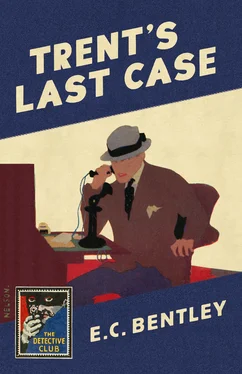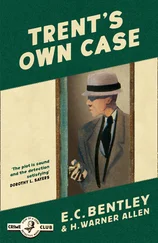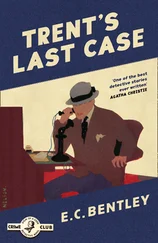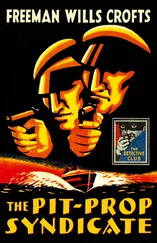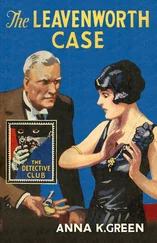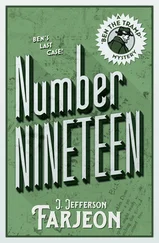‘Murch!’ Trent exclaimed. ‘But he and I are old friends. How under the sun did he get here so soon?’
‘I have no idea,’ Mr Marlowe answered. ‘But he was here last evening, before I got back from Southampton, interviewing everybody, and he’s been about here since eight this morning. He’s in the library now—that’s where the open French window is that you see at the end of the house there. Perhaps you would like to step down there and talk about things.’
‘I think I will,’ said Trent. Marlowe nodded and went on his way. The thick turf of the lawn round which the drive took its circular sweep made Trent’s footsteps as noiseless as a cat’s. In a few moments he was looking in through the open leaves of the window at the southward end of the house, considering with a smile a very broad back and a bent head covered with short grizzled hair. The man within was stooping over a number of papers laid out on the table.
‘’Twas ever thus,’ said Trent in a melancholy tone, at the first sound of which the man within turned round with startling swiftness. ‘From childhood’s hour I’ve seen my fondest hopes decay. I did think I was ahead of Scotland Yard this time, and now here is the hugest officer in the entire Metropolitan force already occupying the position.’
The detective smiled grimly and came to the window. ‘I was expecting you, Mr Trent,’ he said. ‘This is the sort of case that you like.’
‘Since my tastes were being considered,’ Trent replied, stepping into the room, ‘I wish they had followed up the idea by keeping my hated rival out of the business. You have got a long start, too—I know all about it.’ His eyes began to wander round the room. ‘How did you manage it? You are a quick mover, I know; the dun deer’s hide on fleeter foot was never tied; but I don’t see how you got here in time to be at work yesterday evening. Has Scotland Yard secretly started an aviation corps? Or is it in league with the infernal powers? In either case the Home Secretary should be called upon to make a statement.’
‘It’s simpler than that,’ said Mr Murch with professional stolidity. ‘I happened to be on leave with the missus at Halvey, which is only twelve miles or so along the coast. As soon as our people there heard of the murder they told me. I wired to the Chief, and was put in charge of the case at once. I bicycled over yesterday evening, and have been at it since then.’
‘Arising out of that reply,’ said Trent inattentively, ‘how is Mrs Inspector Murch?’
‘Never better, thank you,’ answered the inspector, ‘and frequently speaks of you and the games you used to have with our kids. But you’ll excuse me saying, Mr Trent, that you needn’t trouble to talk your nonsense to me while you’re using your eyes. I know your ways by now. I understand you’ve fallen on your feet as usual, and have the lady’s permission to go over the place and make inquiries.’
‘Such is the fact,’ said Trent. ‘I am going to cut you out again, inspector. I owe you one for beating me over the Abinger case, you old fox. But if you really mean that you’re not inclined for the social amenities just now, let us leave compliments and talk business.’ He stepped to the table, glanced through the papers arranged there in order, and then turned to the open roll-top desk. He looked into the drawers swiftly. ‘I see this has been cleared out. Well now, inspector, I suppose we play the game as before.’
Trent had found himself on a number of occasions in the past thrown into the company of Inspector Murch, who stood high in the councils of the Criminal Investigation Department. He was a quiet, tactful, and very shrewd officer, a man of great courage, with a vivid history in connection with the more dangerous class of criminals. His humanity was as broad as his frame, which was large even for a policeman. Trent and he, through some obscure working of sympathy, had appreciated one another from the beginning, and had formed one of those curious friendships with which it was the younger man’s delight to adorn his experience. The inspector would talk more freely to him than to anyone, under the rose, and they would discuss details and possibilities of every case, to their mutual enlightenment. There were necessarily rules and limits. It was understood between them that Trent made no journalistic use of any point that could only have come to him from an official source. Each of them, moreover, for the honour and prestige of the institution he represented, openly reserved the right to withhold from the other any discovery or inspiration that might come to him which he considered vital to the solution of the difficulty. Trent had insisted on carefully formulating these principles of what he called detective sportsmanship. Mr Murch, who loved a contest, and who only stood to gain by his association with the keen intelligence of the other, entered very heartily into ‘the game’. In these strivings for the credit of the press and of the police, victory sometimes attended the experience and method of the officer, sometimes the quicker brain and livelier imagination of Trent, his gift of instinctively recognising the significant through all disguises.
The inspector then replied to Trent’s last words with cordial agreement. Leaning on either side of the French window, with the deep peace and hazy splendour of the summer landscape before them, they reviewed the case.
Trent had taken out a thin notebook, and as they talked he began to make, with light, secure touches, a rough sketch plan of the room. It was a thing he did habitually on such occasions, and often quite idly, but now and then the habit had served him to good purpose.
This was a large, light apartment at the corner of the house, with generous window-space in two walls. A broad table stood in the middle. As one entered by the window the roll-top desk stood just to the left of it against the wall. The inner door was in the wall to the left, at the farther end of the room; and was faced by a broad window divided into openings of the casement type. A beautifully carved old corner-cupboard rose high against the wall beyond the door, and another cupboard filled a recess beside the fireplace. Some coloured prints of Harunobu, with which Trent promised himself a better acquaintance, hung on what little wall-space was unoccupied by books. These had a very uninspiring appearance of having been bought by the yard and never taken from their shelves. Bound with a sober luxury, the great English novelists, essayists, historians, and poets stood ranged like an army struck dead in its ranks. There were a few chairs made, like the cupboard and table, of old carved oak; a modern armchair and a swivel office-chair before the desk. The room looked costly but very bare. Almost the only portable objects were a great porcelain bowl of a wonderful blue on the table, a clock and some cigar boxes on the mantelshelf, and a movable telephone standard on the top of the desk.
‘Seen the body?’ inquired the inspector.
Trent nodded. ‘And the place where it lay,’ he said.
‘First impressions of this case rather puzzle me,’ said the inspector. ‘From what I heard at Halvey I guessed it might be common robbery and murder by some tramp, though such a thing is very far from common in these parts. But as soon as I began my inquiries I came on some curious points, which by this time I dare say you’ve noted for yourself. The man is shot in his own grounds, quite near the house, to begin with. Yet there’s not the slightest trace of any attempt at burglary. And the body wasn’t robbed. In fact, it would be as plain a case of suicide as you could wish to see, if it wasn’t for certain facts. Here’s another thing: for a month or so past, they tell me, Manderson had been in a queer state of mind. I expect you know already that he and his wife had some trouble between them. The servants had noticed a change in his manner to her for a long time, and for the past week he had scarcely spoken to her. They say he was a changed man, moody and silent—whether on account of that or something else. The lady’s maid says he looked as if something was going to arrive. It’s always easy to remember that people looked like that, after something has happened to them. Still, that’s what they say. There you are again, then: suicide! Now, why wasn’t it suicide, Mr Trent?’
Читать дальше
